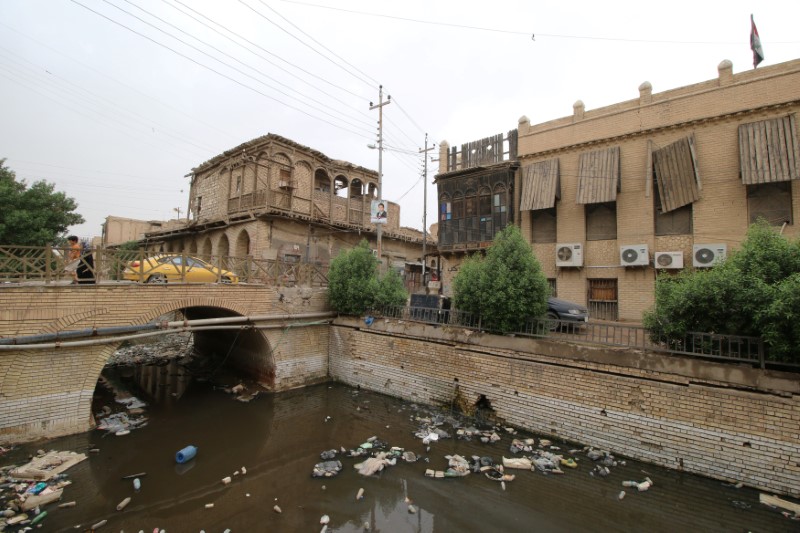By Ulf Laessing
BASRA, Iraq (Reuters) - When Iraqi merchant Jabar Mohamed was growing up in the southern port city of Basra, he liked to watch boats gliding along a canal lined with palm trees and ancient buildings near his home.
Once dubbed the "Venice of the Middle East" for its network of canals resembling the Italian city, Basra was a magnet for Middle Eastern tourists until the early 1980s.
Today the cherished canal of Mohamed's youth is a reeking, refuse-filled cesspool forcing passersby to cover their mouths.
It is a showcase for the virtual absence of public services in a country plagued by turmoil, corruption and decay since the 2003 U.S.-led invasion that toppled Saddam Hussein.
"Basra was once a wonderful place," said Mohamed, 52, who runs a grocery shop established by his father in 1966 in a street full of traditional dwellings that are falling apart.
"But we've had wars and neglect," he said, pointing to the illegible scrawl on a wooden post from the 1960s - the last time Iraqi authorities put up street signs in the city of 2.5 million people, Iraq's second largest, just upstream from the Gulf.
Basrawis interviewed at random said they would not vote in Saturday's parliamentary election or, even if they do, had lost faith that officials would restore their city to its old glory.
A shopping mall, some five-star hotels and elegant restaurants have sprung up in Basra since 2003 thanks to steady oil money - much of Iraq's crude comes from fields nearby - as well as port facilities and an international airport.
These have fuelled an expanding private sector with a middle class largely employed, unlike much of the rest of Iraq.
But since 2003, state authorities have not restored a single house in Basra's historic Old City, made up of Ottoman buildings famous for wood carvings on balconies, windows and ceilings.
State interest in preserving the Old City faded as Iraq went through a ruinous series of wars - with nearby Iran in 1980-88, and U.S.-led coalition forces that ended Saddam's occupation of Kuwait in 1991 and then his rule in 2003. A U.N. embargo in place until 2003 helped kay waste to the oil-driven economy.
Only five historic residences were partially repaired in the 1990s and much of the remaining residential stock is at risk of collapse, according to Azhar Hashim, who runs Basra's historic heritage department.
Her office has carried out studies recommending restorations of scores of Old City residence. "But nothing has happened," Hashim said with a shrug.
STIFLING MISMANAGEMENT
State officials blame a public funding crisis wrought by years of low oil prices. But Basra residents blame a breakdown in public services over the past decades, accelerating under the Saddam-era sanctions.
"It's mismanagement, corruption and theft (of public funds)," said Walid Mustafa, a retired soldier who grew up in an Ottoman house whose roof has collapsed.
Basra is one of the few cities in the Middle East without an effective water treatment system. It boasted an advanced sanitary infrastructure in the 1960s but it broke down decades ago, turning Basra's waterways into cesspools whose stink is compounded by a notoriously hot desert climate.
Even major roads are potholed while civic pride projects such as a "sports city" to host competitions were aborted.
Ali Al-Ghassem, chairman of the Basra Investment Commission, acknowledged mistakes after 2003 in repairing infrastructure.
But he said Basra province and the central government were now working to improve the sewage system thanks to a Japanese loan while a new hospital was being built with help of Kuwait.
The World Bank is also helping Iraq reduce severe air pollution arising from the gas flares of nearby oil fields.
CULTURE AMIDST GARBAGE
Located at Iraq's marshy southern tip where the Euphrates and Tigris rivers merge near the Gulf, Basra was for centuries a melting pot of Arabs, Persians, Turks, Indians and Greeks who all left their cultural imprint.
Much of Iraq suffered destruction in the string of wars since the 1980s. But Basra was especially hard hit as a city on the front line of the war with Iran, only a few dozen km (miles) across the Shatt al-Arab delta to the east.
More devastation occurred in the course of two uprisings by southern Iraq's majority Shi'ite Muslims against the Sunni Saddam that were brutally crushed.
More recently, a drought has almost dried up canals while Basra is also often engulfed in smog blamed on oil production.
Tired of the state failing to restore ancient buildings, local artists are trying to revive a once-vibrant cultural life.
At a refurbished Ottoman palace, art exhibitions and concerts are held as painters, poets and musicians have come back after many years of keeping a low profile to avoid Saddam's agents or, after his overthrow, Islamist militants.
"We now have an event almost every day. Security has improved," said Abdelhak al-Mothafer, head of the state cultural centre in the palace.
But with few inclined to make their way through broken, garbage-strewn streets to the palace, painter Sabri Al-Malek sat alone there one recent day waiting for buyers to materialise.
"I have sold only three of 21 paintings. We don't have any tourists anymore like in the 1970s when Basra had its heyday."

(This refiled version of the story adds word to headline; story text unchanged)